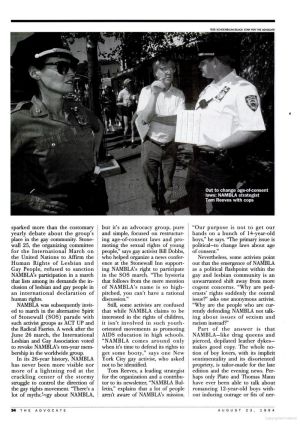One of our staff members is contributing considerably to a News Archiving service at Mu. Any well educated (Masters, PhD or above) users who wish to make comments on news sites, please contact Jim Burton directly rather than using this list, and we can work on maximising view count.
Tom Reeves
Thomas Reeves, known as Tom Reeves (Born in Nashville, Tennessee, 1939; Died in Baltimore on Sunday, February 19, 2012), was an Anarchist Gay activist/organizer, author, professor, and a prominent member of the gay rights movement since the 1970s. Notably, he was a key member of the Boston/Boise Committee, the Fag Rag collective, and founding member of the Committee on Civil Liberties and Sexual Freedom (CCLSF)[1] and Gay & Lesbian Advocates & Defenders (GLAD).[2] He became particularly known for being a co-founder, alongside David Thorstad and others, of the North American Man-Boy Love Association (NAMBLA): a group which advocated reform and abolition of Age of Consent laws which they saw as prosecuting mutually willing gay sex (defined legally as statutory rape). Reeves became a prominent spokesperson for NAMBLA, the organization that "has been among the most controversial groups in LGBT history."[3][4]
From 1976 to 2001, Reeves taught at Boston's historically black Roxbury Community College, where he became a full professor of social sciences and director of the school's Caribbean Focus program. Tom had a particular interest in the plight of Haiti, writing and speaking frequently about the country and joining a number of delegations and humanitarian missions, for which he was honored by the Haitian government. At Tom's invitation, the then recently-overthrown Haitian president Jean-Bertrand Aristide spoke at the college and received an honorary degree in April 1992.
In the late 90s, he was a founding member of the RSO Activist organization now known as NARSOL.
Biography

Born in Nashville, Tennessee, in 1939, Tom was ordained a Methodist minister and pastored a church in Blue Springs, Alabama, while attending Birmingham Southern College, from which he graduated in 1960. He went on to get a Master's of Divinity from Harvard in 1963 and an MA from American University in 1964. Tom did further postgraduate study (1964-66) at the Otto Suhr Institute of Political Science and Humboldt University, both in Berlin.
From his earliest days as a minister, Tom was attracted by the example of Martin Luther King, Jr., with whom he sometimes worked, and was involved in many protests, marches, and sit-ins. An article in the New York Times (April 12, 1960), "Fear and Hatred Grip Birmingham," notes the arrest of "Thomas Reeves, a 21-year-old white student at Birmingham-Southern College and part-time preacher...." It was the earliest of many arrests and stints in jail that Tom faced for his political activism.
In the late '60s, Tom worked and taught in Washington, D.C., teaching at, among other schools, American University. He was the director of the National Council to Repeal the Draft. From 1969 to '71 he was a speechwriter for US senators Michael Gravel, Mike Hatfield, and George McGovern, the latter two of whom wrote introductions to The End of the Draft (Random House and Vintage Press, 1970), a book Tom co-wrote with Barry Goldwater speechwriter Karl Hess.
Tom's work against the draft brought him to national prominence. A front-page story in the Harvard Crimson (March 2, 1970) reported on his speech the night before at Kirkland House. "'[T]here is a realistic chance of repealing the draft' in view of the wide-ranging agreement across the political spectrum on this issue," the paper reported. "Reeves said that 'people are challenging the idea that the central state should have the power to tell others how to run their lives.'"
After returning to Boston in the early 70s, Tom joined the burgeoning gay liberation movement based around the Charles Street Coffeehouse. He frequently contributed to Gay Community News. As part of the radical Fag Rag collective and the Boston-Boise Committee, he tried to create a liberated gay culture.
As a follow-up to the Boston-Boise Committee, Tom organized a conference on December 2, 1978, on the issue of ages of consent. At that conference, a group later known as the North American Man/Boy Love Association was formed by a caucus of several dozen in attendance. Tom strove over many years to convey the message that sex was something to celebrate, not fear. However moral panics ensued in the 1980s and '90s, fueled by hysterias over the McMartin preschool case, 'Satanic abuse,' and recovered memories. All were shown to be without basis, but were used to hammer NAMBLA. Less radical gays soon to be mainstream separated from Tom on this issue.
Yet Tom was also a founding member and organizer of groups that would become more mainstream, such as Gay and Lesbian Advocates and Defenders (GLAD), which grew out of the Boston-Boise Committee, and later, in the midst of the AIDS crisis, ACT UP.
Tom's writings appeared in such diverse publications as the Baltimore Sun, Counterpunch, Montreal Gazette, NACLA Report (on Central American affairs), and Z Magazine.
Tom's last years were spent in Montreal, Baltimore, and Spain, before dying of heart failure at age 72.
Further reading, and external links
- An Extraordinary Life: A Few Pieces By, Or About, Tom Reeves; our Departed Founder - NAMBLA Website.
- BoyWiki
- Rosa von Praunheim, Interview with Reeves in Army of Lovers (1979). where he makes various important statements about his philosophy and personal life.[5]
See also
References
- ↑ A little-known organization, according to The Guide (November 1987, Fidelity Publishing, Edward T. Hougen et al.): The Committee on Civil Liberties and Sexual Freedom (CCLSF) was founded by around 30 men and women in Boston, MA, in the summer of 1987, "to help protect the legal rights of the "victims" and the accused in cases alleging non-coercive sexual activity between gay people and teenagers. Two members of openly gay Boston City Councillor David Scondra's staff [Gary Dotterman and French Wall] were on the CCLSF. One of the cases adopted by the CCLSF involved Donald Dobson and two teenagers from Puerto Rico. The CCLSF decided to focus on the rights of the teenagers in this case. The case recieved considerable attention in the gay press throughout the summer." (p. 12). Named members of the CCLSF we are aware of, other than Tom Reeves, include: Margaret Hougen, Rev. Bob Wheatly, Gary Dotterman and French Wall.
- ↑ Reeves was involved in multiple gay organizations, and was one of many Boston Boise members who sat on GLAD's first Board. In his own words: "I was involved with many new gay organizations: Gay Community News, Boston Area Gay & Lesbian Youth (BAGLY), Gay & Lesbian Advocates and Defenders (GLAD), the Gay Liberation Front, and much later Act Up." - Reeves, An Extraordinary Life. NAMBLA Website. Reeves was a founder of the Boston/Boise Committee: "Garrett Byrne, Suffolk County district attorney, was running for reelection in 1977. He turned two series of arrests for public lewdness in Boston Public Library restrooms and for statutory rape at a house in Revere into an anti-gay crusade. Tom Reeves and his fellow Fag Rag members, ministers and congregants of the Metropolitan Community Church, and other gay leaders fought back, forming the Boston-Boise Committee." - Remembering Tom Reeves. NAMBLA Website.
- ↑ https://www.encyclopedia.com/social-sciences/encyclopedias-almanacs-transcripts-and-maps/north-american-manboy-love-association-nambla
- ↑ Gay histories and cultures: an encyclopedia. Archived April 13, 2016, at the Wayback Machine By George E. Haggerty p. 628.
- ↑ E.g. "I think the gay movement has said that we do not recruit children and we are not interested in adolescents. Well, I am interested in recruiting teenagers. I am interested in recruiting every gay teenager who is out there. I want him to know he is gay. I want him to be proud of it as soon as possible, as early as possible, because of all the pain and suffering that kids go through that makes their lives fucked up from then on. I think a teenager can know and be aware of his sexuality when he is 13. And it is so much more easy for him, and his whole life fits better for him, than if he has to painfully struggle and find out when he is in his twenties. Also, I am very happy to say that I recruit people away from the middle-class, uptight, violent family, from creating more of those. And that does not mean that a boy would necessarily be exclusively homosexual, but that he simply would not want to reproduce exactly the robot kind of family he grew up and was unhappy in."
